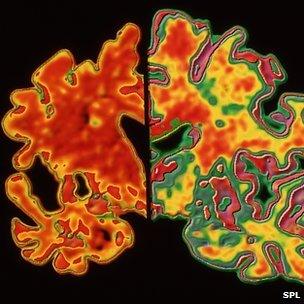Dementia: Thousands undiagnosed in Wales - Alzheimer's Society
- Published

A brain affected by Alzheimer's (left) compared to healthy brain tissue
Tens of thousands of people remain undiagnosed with dementia in Wales and are missing out on the support they need, says the Alzheimer's Society.
Figures compiled by the charity suggests Wales has the lowest diagnosis rates in the UK for the condition.
The Wales diagnosis rate is 38.5%, compared to an overall UK figure of 46%.
The Welsh government said it was aware of the issue and was taking action to address it.
More than 17,000 people have been confirmed with dementia in Wales, an increase of 800 on the previous year, but the society believes there are another 27,000 who have not been diagnosed.
Sue Phelps, director for the Alzheimer's Society in Wales said: "It's encouraging to see any increase in the number of people that are receiving a diagnosis.
"But less than half of people that are living with dementia in Wales aren't receiving the support, benefits and the medical treatments that are often available.
"The NHS has already made a commitment to improving diagnosis rates but the rate in Wales has barely shifted.
"It is time for that commitment to turn into action, to help ensure people can live well with the condition."
Diagnosis rates vary across the country from 38.5% - up from 37.4% in 2011 - in Wales to 63% in Northern Ireland and 64.4% in Scotland.
Those living in south Wales are said to be more likely to get a diagnosis than those living in north Wales.
A Welsh government spokesperson said: "We are aware that there are issues with dementia diagnosis, and have asked the National Leadership and Innovation Agency for Health (NLIAH) to look into this matter.
"We have developed intelligent targets to improve early identification and have set targets to improve this. We have also asked Public Health Wales and NLIAH to develop a training module for GP practices including the whole primary health care team on improving diagnosis, and this work has begun.
"We also anticipate that Mental Health (Wales) Measure will have an impact, supporting both diagnosis and referral on to memory clinics for those affected by dementia."
- Published3 July 2012
- Published21 May 2012
- Published14 December 2011
- Published21 February 2011
- Published25 October 2011